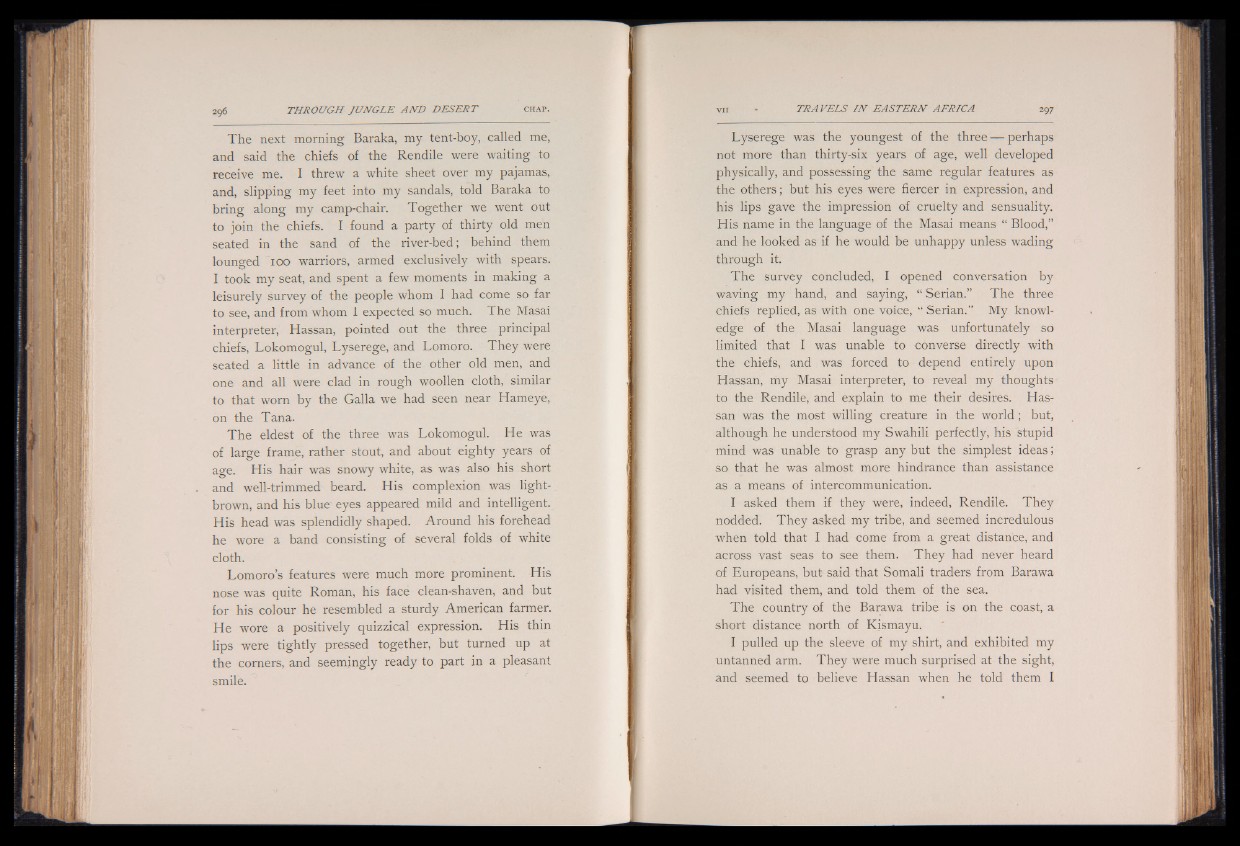
The next morning Baraka, my tent-boy, called me,
and said the chiefs of the Rendile were waiting to
receive me. I threw a white sheet over my pajamas,
and, slipping my feet into my sandals, told Baraka to
bring along my camp-chair. Together we went out
to join the chiefs. I found a party of thirty old men
seated in the sand of the river-bed; behind them
lounged 100 warriors, armed exclusively with spears.
I took my seat, and spent a few moments in making a
leisurely survey of the people whom I had come so far
to see, and from whom I expected so much. The Masai
interpreter, Hassan, pointed out the three principal
chiefs, Lokomogul, Lyserege, and Lomoro. They were
seated a little in advance of the other old men, and
one and all were clad in rough woollen cloth, similar
to that worn by the Galla we had seen near Hameye,
on the Tana.
The eldest of the three was Lokomogul. He was
of large frame, rather stout, and about eighty years of
age. His hair was snowy white, as was also his short
and well-trimmed beard. His complexion was light-
brown, and his blue eyes appeared mild and intelligent.
His head was splendidly shaped. Around his forehead
he wore a band consisting of several folds of white
cloth.
Lomoro’s features were much more prominent. His
nose was quite Roman, his face clean-shaven, and but
for his colour he resembled a sturdy American farmer.
He wore a positively quizzical expression. His thin
lips were tightly pressed together, but turned up at
the comers, and seemingly ready to part in a pleasant
smile.
Lyserege was the youngest of the three — perhaps
not more than thirty-six years of age, well developed
physically, and possessing the same regular features as
the others; but his eyes were fiercer in expression, and
his lips gave the impression of cruelty and sensuality.
His name in the language of the Masai means “ Blood,”
and he looked as if he would be unhappy unless wading
through it.
The survey concluded, I opened conversation by
waving my hand, and saying, “ Serian.” The three
chiefs replied, as with one voice, “ Serian.” My knowledge
of the Masai language was unfortunately so
limited that I was unable to converse directly with
the chiefs, and was forced to depend entirely upon
Hassan, my Masai interpreter, to reveal my thoughts
to the Rendile, and explain to me their desires. Hassan
was the most willing creature in the world; but,
although he understood my Swahili perfectly, his stupid
mind was unable to grasp any but the simplest ideas;
so that he was almost more hindrance than assistance
as a means of intercommunication.
I asked them if they were, indeed, Rendile. They
nodded. They asked my tribe, and seemed incredulous
when told that I had come from a great distance, and
across vast seas to see them. They had never heard
of Europeans, but said that Somali traders from Barawa
had visited them, and told them of the sea.
The country of the Barawa tribe is on the coast, a
short distance north of Kismayu.
I pulled up the sleeve of my shirt, and exhibited my
untanned arm. They were much surprised at the sight,
and seemed to believe Hassan when he told them I